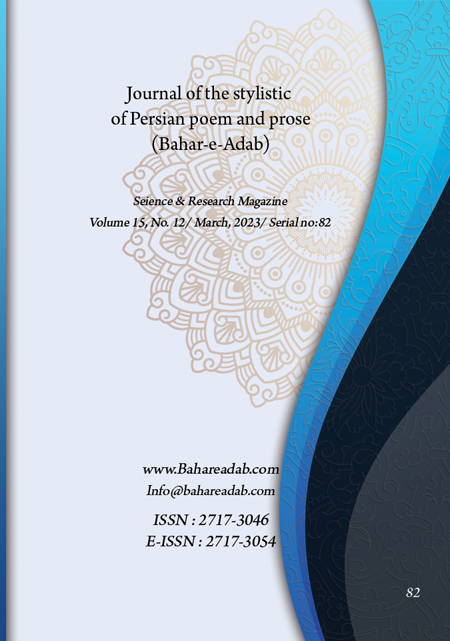- Count View : 503
- آدرس کوتاه شده مقاله: https://bahareadab.com/article_id/1415
- کد DOI مقاله: DOI:10.22034/bahareadab.2023 .15 .6815
Journal of the stylistic of Persian poem and prose
volume Number 15،
number In Volume 12،
،
issue Number 82
A study of the stylistics of Jawahar al-Asrar Azari Tusi Esfarayeni
Esmaeil Zaremand , Ali Ramezani (Author in Charge), Rasoul Ebadi
Abstract
BACKGROUND AND OBJECTIVES: Sheikh Azari Tusi Esfarayeni is one of the poets and writers of the Timurid period. The book Jawahar al-Asrar is one of his famous writings on the subjects of the Muqattaah Letters, mysticism, hadith and poetry. In this article, by introducing the Manuscripts of the book, has been studied its linguistic, rhetorical and intellectual style.
METHODOLOGY: Data collection in the article is library method and its writing is descriptive-analytical method. The statistical population is four manuscripts of Azeri Jawahar al-Asrar.
FINDINGS: Jawahar al-Asrar is written in the general style according to the style of the Timurid period. in the introductions, is the rhyming prose and the text of the book is simple. At the phonetic level of the language style: rhyme, pun, word repetition, Alliteration, rejection and reverse, at the lexical level: Arabic words and at the syntactic level: synonyms of words, titles and adjectives, matching of adjectives and adjectives, use of Arabic sentences instead of adjectives, Has a light characteristic. At the literary level, has similes, Imitation, Allusion, metaphors, allusions, Metonymy, allegories and proverbs. In his intellectual style, he has described and interpreted the letters of the Qur"an, hadiths, the words of mystics and the problems of the poets" poetry. In his interpretations, can be seen his mastery of syntax, mathematics, rhetoric, medicine and astronomy.
CONCLUSION: Azari Tusi Esfarayeni in Jawahar al-Asrar in accordance with the style of prose of the Timurid era, with a tendency to use words, Arabic sentences, Persian and Arabic poems, prose in introductions and simple language in the text, the use of metaphors, Imitation, Allusion, adaptation, Metonymy, Allegory and proverb has succeeded. As a commentator and critic, he has been able to provide the audience with useful information about syllables, hadiths, mystical subjects, difficult descriptions of poets" poetry, as well as historical, religious, medical, astronomical and biographical information of elders from his book.
Keyword
Azeri Tusi
, Jawahar al-Asrar
, manuscript
, style
, language
, rhetoric
, thought
- Azari Esfarayeni, Hamzeh Ibn Ali. (2011). Divan Azari Esfarayeni, research and correction by Mohsen Kiani & Seyed Abbas Rastakhiz. Tehran: Museum and Documentation Center of the Islamic Consultative Assembly.
- Azari Tusi, Hamza Ibn Ali. (undated). Jawahar al-Asrar, manuscript of the Center for the Revival of Islamic Heritage, No. 812.
- Azari Tusi, Hamzah Ibn Ali. (undated). Jawahar al-Asrar, Pakistani Treasure Manuscript, No. 890 and 290/472.
- Azari Tusi, Hamzah Ibn Ali. (undated). Jewels of Secrets, Parliamentary Manuscript 2, No. 5882.
- Azari Tusi, Hamzah Ibn Ali. (undated). Manuscript of Jawahar al-Asrar, Tehran: Library of the Islamic Consultative Assembly, No. 14477.
- Bahar, Mohammad Taghi. (1970). Stylistics, Volume 3, Tehran: Amirkabir.
- Dehkhoda, Ali Akbar. (1994). Dehkhoda Dictionary, Tehran: University of Tehran.
- Fotouhi, Mahmoud. (2011). Stylistics of theories, approaches and methods, Tehran: Sokhan.
- Hendushah Astarabadi, Mohammad Ghasem. (2009). Tarikh Fereshteh, vol. 2, correction, suspension and explanation by Mohammad Reza Nasiri, Tehran: Association of Cultural Works and Honors.
- Nafisi, Saeed. (1984). History of poetry and prose in Iran and in Persian language until the end of the tenth century AH, Tehran: Foroughi Bookstore.
- Nezami, Elias Ibn Yousef. (2009). Khosrow and Shirin, edited by Hassan Vahid Dastgerdi, by Saeed Hamidian, Tehran: Qatreh.
- Safa, Zabihollah. (1959). A brief history of the evolution of Persian poetry and prose, Tehran: University of Tehran Press.
- Safa, Zabihullah. (1985). History of Iranian Literature, Volume 4: Tehran: Ferdows.
- Samarqandi, Amir Dolatshah. (2003). Tazkereh Shoara, edited by Edward Brown, Tehran: Asatir. Shamisa, Sirus. (1998). Stylistics of prose, Tehran: Mitra.

